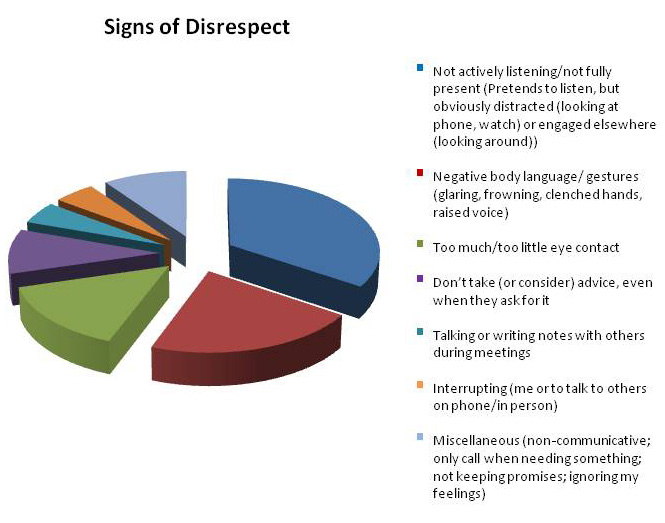I recently did a quick survey in which I asked people to identify the subtle signs that others respect or disrespect them. The results, in terms of the signs of disrespect, are summarized below:
As you can see, the biggest form of disrespect comes in the area of active listening/ engagement in the conversation, followed by reinforcement of that engagement through our body language and eye contact (either too much or too little). These related factors were mentioned in 36% of the responses. Right behind those factors (representing another 20% of responses) were: a) not considering advice when offered, b) talking/writing with others during meetings, and c) interrupting a conversation to converse with others (either by interjecting our own comments or by answering phone calls and texts).
In fact, let’s take a look at one particular situation that was mentioned most often as disrespectful – that of being distracted by cell phones (either by interrupting to answer calls or responding to text messages) due to the fear that we might miss something important if a call or text were missed.
In the world of systems analysis and programming, there is a saying: “Don’t program for the exception.” What this means is that we shouldn’t waste our time and effort on the 1% of scenarios that will likely never happen. Instead, we must do our best to ensure that the other 99% of situations will be handled in the best possible way.
I’ll offer the same advice for your life. 99% of the phone calls and texts we receive on a regular basis will not be so critical that they will negatively impact your life. So, don’t sabotage or sacrifice your in-person, everyday relationships by allowing yourself to focus on possible missed calls and texts when you should be building strong relationships by showing people the respect of being fully present when interacting with them.
Consider this: if you never build strong, respectful relationships in person, no one will ever make a phone call to you that is so important that you absolutely can’t miss it!
Here’s a tip: If you are expecting an important call and must keep the phone handy, tell the person you’re speaking with up front that you’re expecting an important call and must at least look at the phone if it rings. Notifying them and apologizing in advance for this potentially “rude” behavior completely takes the rudeness out of it because now they know why you’re doing it, and you’ll have their complete understanding and “permission” to do so. Just don’t make a habit of this, or they’ll begin to think it’s just a ruse to justify habitual rude behavior. One action that makes me feel very respected is when someone’s phone rings during a conversation with me, I ask if they need to answer it, and they tell me, “No. It can wait until we’re done.” WOW – and thank you! (And the next time that person has a ringing phone and does need to get it, I’ll be extra understanding because I know it’s not their habit to interrupt unnecessarily.)
The upshot of respect is this: It turns out that disengagement in personal conversations (which is perceived as disrespect) is as negatively perceived as disengagement in the workplace, which is also often viewed as a form of disrespect.
So, no matter what situation you find yourself in, be fully present and engaged, demonstrate the kind of respect you’d like to receive if you were trying to engage another person, and always remember that if you give your best for the 99% of situations that are likely to occur, you’ll be more easily forgiven for the 1% of the time that it’s just not possible.


